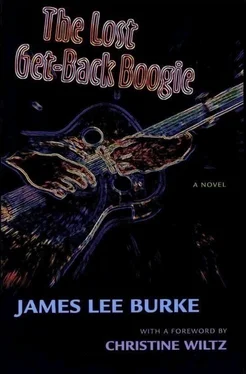“You just getting out?” the man said. He said it in the flat, casual tone that most free people use toward convicts, that same quality of voice behind the Xeroxed letters from Boston asking for the donation of our eyes.
I put three dollar bills on the bar and walked toward the square of sunlight against the front door.
“Say, buddy, it don’t matter to me what you’re getting out of. I was just saying my cousin will give you a ride up to the highway in a few minutes.”
I walked down the oiled road a quarter of a mile, and his cousin picked me up in a stake truck and drove me all the way to the train depot in Baton Rouge.
I could have taken a bus home or hitchhiked, because it was only a three-hour trip to the coast, but I always loved trains, their rows of quiet, angular seats and the suck and rattle of the vestibule opening, and also, there is no dignity in hitchhiking when you are thirty years old. The clapboard general stores and taverns and oaks clicked by the window, and beyond the highway the gray trees of the marsh began. Negroes in flop straw hats cane-fished along the canal, and white cranes rose with their wings gilded in the sunlight above the dead cypress. The butcher boy swayed down the aisle with the roll of the train, his basket loaded with magazines, newspapers, cans of grape drink, and paper cones of plums. I bought a Times-Picayune from him and walked to the club car.
The porter brought me a Jax, and after I tired of the front page and its serious treatment of something the state legislature was doing, I sipped the beer and watched the fields of new sugar cane and black Angus roll past. But as we neared New Orleans, the country began to change. Somebody had been busy in the last two years; it was no longer a rural section of the delta. Land-development signs stood along the highway, replacing the old ads for patent medicine and Purina feed, and great areas of marsh had been bulldozed out and covered with landfill for subdivision tracts. Mobile-home offices strung with colored flags sat on cinder blocks in the mud, with acres of waste in the background that were already marked into housing plots with surveyors’ stakes. The shopping-center boys had been hard at work, too. Pecan orchards and dairy barns had become Food City, Winn-Dixie, and Cash Discount.
I had to change trains in New Orleans for the rest of the trip home. The train was an old one, with dusty seats and yellowed windows cracked on the outside of the double glass with BB holes. We crossed the Mississippi, and my head reeled when I looked down from the window at the wide expanse of water far below. The tugboats and Standard Oil barges and the brown scratches of wake off their hulls looked as miniature and flat as painted pieces on a map. The train clicked slowly across the bridge and the long stretch of elevated track above the levee and mud flats and willow trees, then began to gain speed and bend through the bayou country and the achingly beautiful dark green of the cypress and oak trees, covered with moss and bursting at the roots with mushrooms and cowslips.
Most of the passengers in my car were French people, with cardboard suitcases and boxes tied with string in the luggage rack. An old man in overalls and a suit jacket was speaking French to his wife in the seat behind me, and I listened to them with a violation of privacy that normally I would have walked away from. But in Angola the hacks, who came primarily from north Louisiana and Mississippi, never allowed anyone to speak French in their presence, and even back in the Block it wasn’t used unless there was no non-French-speaking person within earshot, because it was considered to have the same clandestine quality as a private whisper between two snitches.
The train crossed Bayou Lafourche, and I leaned into the window and looked at the men in pirogues floating motionlessly against the cypress roots, their cane poles arched and beaten with light against the pull of a bull bream below the lily pads. Before the train moved back into that long corridor of trees through the swamp, I saw one man rip a large goggle-eye perch through a torn leaf and dip one hand quickly into the water with the cane bending in his other hand, the boat almost tilted into the shallows, and catch the line in his fingers and pull the fish slowly away from the lily pads.
Then we were back into the long span of track through the trees and the dead water in the irrigation canals and the occasional farmhouses that you could see beyond the railroad right-of-way. I walked up to the dub car and had a bourbon and water while the train slowed into my hometown. The X signs and LOUISIANA LAW STOP warnings on the crossings moved by gradually with the decreased speed of the train, and then the uplifted faces of the people on the platform stared suddenly at mine, then turned with a quick brightness of recognition at someone stepping off the vestibule.
There was an ice wagon on the loading ramp with a tarpaulin stretched across the ice blocks, and the evaporated coldness steamed on top of the canvas in the sun. Two taxicabs were parked in the shade of an oak that grew through the sidewalk in front of the depot.
“Do you know how to get to Robert Paret’s place?” I said.
“Who?” The taxi driver’s breath was full of beer through the window, and he smoked a filter-tipped cigarette in a gap between his teeth.
“It’s up Joe’s Shipyard road. You reckon you can take me there?”
“That’s fifteen miles, podna. I’ll turn the meter off for you, but it’ll still cost you ten dollars and maybe some for the tires I bust on that board road up there.”
The town was changed. Or maybe it had been changing for a long time and I hadn’t noticed it. Many of the old brick and wood-front stores had gone out of business, the hotel had a FOR LEASE sign in its dusty main window, and only a few cars were parked in front of the beer tavern and pool hall on the corner. The dime store, which used to be crowded with Negroes on Saturday afternoon, was almost empty. We passed the courthouse square and the lines of oak trees shading the wide sidewalks and wooden benches where the old men used to sit, but it looked like a discarded movie set. The Confederate monument, inscribed at the base with the words THEY DIED IN DEFENSE OF A HOLY CAUSE, was spotted with pigeon droppings, and someone had stuffed trash paper in the barrel of the Civil War cannon next to it. Only one or two offices besides the bail bondsman’s were open, and the corner bar that used to have a card game upstairs was now boarded over.
“Where did the town go?” I said.
“It just dried up after they put in that new highway,” the driver said. “People ain’t going to drive into town when you can get everything you need out there. You just getting out of the service or something?”
“I’ve been away awhile.”
“Well, there’s lots of money to be made here. Like, I could be making twice what I’m getting today if that dispatcher didn’t put me on call at the depot.” He belched down in his throat and loosened a can of beer from a six-pack on the seat. He pulled the ring, and the foam slid over his thumb. “You can pick up fares at the airport and run them a half mile down to the motel, and what you get on tips is more money than I make all afternoon at the depot. Take one of them beers if you like.”
“Thank you,” I said. The can was hot, but I drank it anyway.
We drove out into the parish, crossed the wooden bridge over the bayou at the end of the blacktop, and bounced along the yellow, rutted road by the edge of Joe’s Shipyard. Shrimp boats, rusted oil barges, and quarter boats used by seismograph companies were moored along the docks in the dead water, and Negro children were fishing with cane poles for bullheads and gars among the cattails. The driver was out of beer, and we stopped at a tavern filled with deckhands, fishermen, and doodlebuggers (seismograph workers), and I bought him a round at the bar and a carton of Jax to go.
Читать дальше












